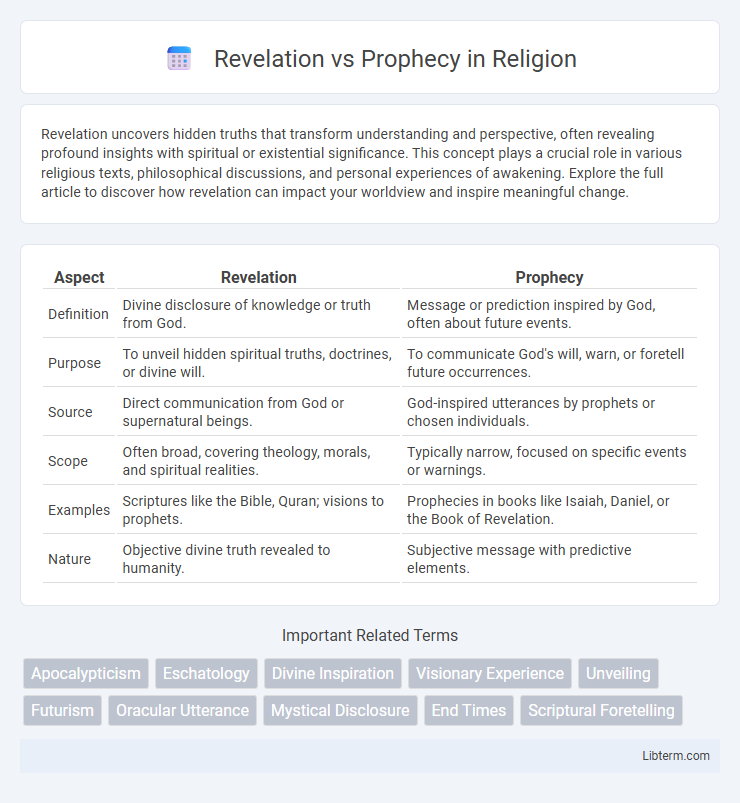Revelation uncovers hidden truths that transform understanding and perspective, often revealing profound insights with spiritual or existential significance. This concept plays a crucial role in various religious texts, philosophical discussions, and personal experiences of awakening. Explore the full article to discover how revelation can impact your worldview and inspire meaningful change.
Table of Comparison
| Aspect | Revelation | Prophecy |
|---|---|---|
| Definition | Divine disclosure of knowledge or truth from God. | Message or prediction inspired by God, often about future events. |
| Purpose | To unveil hidden spiritual truths, doctrines, or divine will. | To communicate God's will, warn, or foretell future occurrences. |
| Source | Direct communication from God or supernatural beings. | God-inspired utterances by prophets or chosen individuals. |
| Scope | Often broad, covering theology, morals, and spiritual realities. | Typically narrow, focused on specific events or warnings. |
| Examples | Scriptures like the Bible, Quran; visions to prophets. | Prophecies in books like Isaiah, Daniel, or the Book of Revelation. |
| Nature | Objective divine truth revealed to humanity. | Subjective message with predictive elements. |
Defining Revelation and Prophecy
Revelation refers to the divine or supernatural disclosure of knowledge or truth, often conveyed through visions, dreams, or sacred texts, revealing God's will to humanity. Prophecy specifically involves receiving and communicating messages from God, typically predicting future events or admonishing people to adhere to divine laws. While all prophecy is a form of revelation, not all revelations are prophetic, as some reveal spiritual truths without forecasting future occurrences.
Origins and Sources of Revelation
Revelation originates from divine or supernatural sources, often considered direct communication from God or higher powers, providing authoritative knowledge or truth. Prophecy, while rooted in revelation, specifically involves predictions or messages about future events delivered by prophets acting as intermediaries. The sources of revelation span sacred texts, spiritual experiences, and visionary encounters, forming the foundation for religious doctrines and spiritual insights.
Nature and Purpose of Prophecy
Prophecy serves as a divine communication method where God reveals future events or spiritual truths to a prophet, aiming to guide, warn, or encourage the people. Its nature is both predictive and exhortative, often addressing moral conduct and calling for repentance based on revealed insights. Unlike general revelation, prophecy functions as a purposeful message that influences human behavior by unveiling God's will and intentions.
Key Differences Between Revelation and Prophecy
Revelation refers to the divine or supernatural disclosure of hidden knowledge or truth, often presented as a complete or specific message from a deity, while prophecy involves foretelling future events or providing guidance inspired by divine insight. Revelation typically encompasses broader spiritual truths and knowledge, whereas prophecy emphasizes prediction and instruction related to future occurrences. The key difference lies in revelation's focus on unveiling ultimate truths, compared to prophecy's role in delivering anticipatory messages or warnings based on that truth.
Historical Perspectives on Revelation
Historical perspectives on revelation examine how divine knowledge has been conveyed through sacred texts, visions, and prophetic experiences across different cultures. Scholars analyze ancient religious traditions, such as those in Judaism, Christianity, and Islam, emphasizing the role of revelation as a foundational source of theological and moral guidance. The distinction between revelation as direct divine disclosure and prophecy as inspired interpretation reflects evolving religious understandings throughout history.
Prophets and Their Roles in Religious Traditions
Prophets serve as intermediaries who receive divine messages, often delivering predictions or guidance that shape religious beliefs and practices. Their roles vary across traditions but commonly include acting as moral exemplars, warning communities of future consequences, and fostering spiritual renewal. Prophecy functions as a dynamic process that influences theological interpretation and ethical conduct within faith communities.
Revelation in Major World Religions
Revelation in major world religions such as Christianity, Islam, and Judaism refers to the divine communication of sacred truths directly from God to humanity, often recorded in holy scriptures like the Bible, Quran, and Torah. Revelation encompasses both written texts and spiritual experiences that convey God's will, laws, and guidance, shaping religious doctrines and ethical systems. Distinct from prophecy, which primarily involves foretelling future events or delivering specific messages, revelation serves as the foundational source of divine knowledge and religious authority in these faith traditions.
Interpreting Prophecy: Methods and Challenges
Interpreting prophecy requires analyzing symbolic language, historical context, and theological themes to uncover intended meanings. Challenges include distinguishing metaphor from literal prediction, cultural differences, and evolving interpretations across traditions. Effective methods combine linguistic study, exegetical frameworks, and comparative analysis to enhance clarity and relevance.
The Impact of Revelation and Prophecy on Belief Systems
Revelation and prophecy shape belief systems by providing divine insights that guide moral frameworks and religious practices. Revelation offers foundational truths considered directly revealed from a higher power, establishing core doctrines that unify faith communities. Prophecy influences beliefs through predicted events or warnings, motivating ethical behavior and reinforcing faith in divine intervention.
Contemporary Relevance of Revelations and Prophecies
Revelation offers direct insight or divine truth believed to be communicated by a higher power, often providing clarity and guidance amid uncertainty, which remains crucial in contemporary spiritual and religious contexts. Prophecy involves predictive or declarative messages about future events, influencing moral behavior and decision-making in modern societies by shaping cultural and ethical perspectives. Both revelations and prophecies contribute to personal faith and collective identity, impacting ethical frameworks and social movements worldwide.
Revelation Infographic

 libterm.com
libterm.com